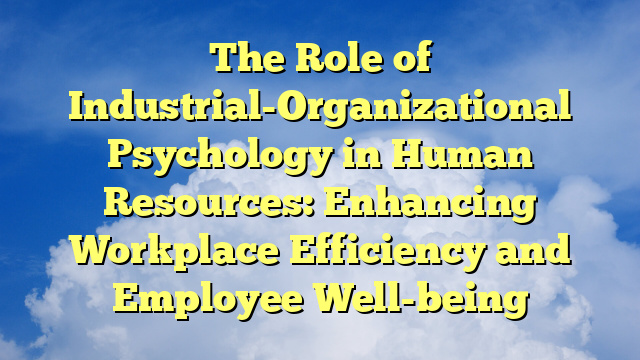The Role of Industrial-Organizational Psychology in Human Resources: Enhancing Workplace Efficiency and Employee Well-being
The Role of Industrial-Organizational Psychology in Human Resources: Enhancing Workplace Efficiency and Employee Well-being
Introduction
Industrial-Organizational (I-O) psychology is a field that focuses on applying psychological principles and theories to improve workplace efficiency and enhance employee well-being. In the context of human resources, I-O psychology plays a crucial role in understanding and managing the behavior of individuals and groups within organizations. This article explores the various ways in which I-O psychology contributes to the success of human resources departments and ultimately benefits both employees and employers.
Understanding Employee Behavior
One of the primary areas where I-O psychology makes a significant impact is in understanding employee behavior. By studying individual and group dynamics, I-O psychologists can identify factors that influence employee motivation, job satisfaction, and performance. This knowledge allows human resources professionals to design effective recruitment and selection processes, as well as develop strategies for employee engagement and retention.
Recruitment and Selection
Recruiting and selecting the right candidates for job positions is crucial for the success of any organization. I-O psychologists use their expertise to develop scientifically valid selection methods, such as assessments and interviews, that accurately predict job performance. By implementing these methods, human resources departments can ensure that they hire individuals who possess the necessary skills and traits to excel in their roles.
Moreover, I-O psychologists also assist in creating job descriptions and specifications that accurately reflect the requirements of the position. This helps attract candidates who are genuinely interested and qualified for the job, reducing turnover rates and increasing overall employee satisfaction.
Employee Engagement and Retention
Employee engagement refers to the level of commitment and enthusiasm employees have towards their work and the organization. I-O psychologists play a vital role in enhancing employee engagement by identifying factors that contribute to job satisfaction and designing interventions to improve it.
Through surveys, interviews, and focus groups, I-O psychologists gather data on employee attitudes, perceptions, and experiences. This information allows human resources professionals to address any issues or concerns that may be affecting employee engagement. By implementing strategies such as training and development programs, flexible work arrangements, and recognition initiatives, organizations can foster a positive work environment that promotes employee well-being and productivity.
Furthermore, I-O psychologists also contribute to employee retention efforts. By understanding the factors that lead to turnover, such as job dissatisfaction or lack of growth opportunities, they can develop strategies to mitigate these issues. This may involve implementing career development programs, providing mentoring and coaching, or improving communication channels within the organization.
Workplace Diversity and Inclusion
I-O psychology also plays a crucial role in promoting workplace diversity and inclusion. By studying the impact of diversity on organizational outcomes, I-O psychologists help human resources departments create inclusive policies and practices that value and respect individuals from different backgrounds.
Through training programs and workshops, I-O psychologists educate employees and managers about the benefits of diversity and how to effectively manage diverse teams. They also assist in developing fair and unbiased selection processes to ensure equal opportunities for all candidates.
Organizational Development and Change
Organizational development and change are inevitable in today’s dynamic business environment. I-O psychologists contribute to these processes by providing insights into how individuals and groups react to change and how to effectively manage it.
By conducting organizational assessments and analyzing data, I-O psychologists help human resources professionals identify areas for improvement and develop strategies to implement change successfully. They also assist in managing resistance to change by addressing employee concerns and providing support throughout the transition.
Conclusion
The role of industrial-organizational psychology in human resources is crucial for enhancing workplace efficiency and employee well-being. By understanding employee behavior, recruiting and selecting the right candidates, promoting employee engagement and retention, fostering workplace diversity and inclusion, and facilitating organizational development and change, I-O psychologists contribute to the overall success of organizations. Human resources departments that incorporate I-O psychology principles and practices are better equipped to create a positive work environment that maximizes employee potential and drives organizational growth.

